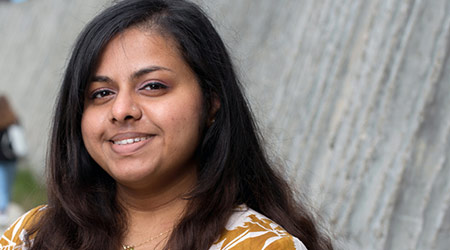Santhiya Sivasthasan has dysphasia and believes you should never give up!
Profile
I’m currently in my third year doing a Bachelor's degree in social sciences, with a minor in political science. My dysphasia, which affects phonoloy and syntax, impairs my ability to write, and my oral communication and verbal memory. It takes me a really long time to write anything because the sentences move in all directions. When I try to express myself orally, I find it difficult to structure and organise my thoughts. As for remembering long series of words, I just can't do it. Taking notes in classes that are poorly structured poses an additional difficulty.
How are you managing your studies and what reasonable adjustments have you been able to set up?
I was worried in my first year, but things got better in my second and third year. We shouldn’t underestimate the difference between secondary school and university. The other students at my secondary school knew I was dysphasic and they often criticised me because I got extra time to complete tasks. At UNIL you are less visible, so I did not feel stigmatised. It was difficult to ask for reasonable adjustments to be made for the exams, as the speech therapy certificate I had at school was no longer valid (it has to cover the period of studies at UNIL). I had to retake all the diagnostic tests for dysphasia, which was stressful. Also, I felt that I was being stuck with a 'disability' label. When I got the new certificate from the speech and language therapist, I was able to obtain the adjustments I needed (extra time and modified equipment). This compensates for my learning difficulties but does not give me an unfair advantage over other students.
I love writing, even if what I write is not structured and I make lots of mistakes. I try to write scripts for films, with dialogue and organised in scenes, because practising helps me learn. Sometimes I use software packages. These help me by providing a structure into which I insert my text. When speaking, I also have to overcome my shyness, but the most important thing is to DARE to do it! And above all, to remind ourselves that we can only do what we can. That said, I really love talking more than anything. It was something hidden inside me for a long time because of my problems, and I have only recently found out about it.
We have to talk in our seminars in the first year. This was not easy for me, either. I make up a story or visualise images to help me stay focused on what I want to say and remember it.
What advice would you give to students with dysphasia?
Joining clubs is good for motivation, because they meet every week and you have to express yourself and defend your opinions. At all costs, avoid staying in your bubble. Even if we make mistakes, it doesn’t matter, we have to give it a go. Obviously, it is easier if you are in a reassuring environment and the people you are talking to are empathetic.
It is also important to be able to rely on the help of other students and to make friends. Joining your faculty's student union is a good way to develop friendships. This worked for me as a member of the AESSP [the student union for the faculty of social and political sciences]. You can even do it through social media.
Don’t think you shouldn't sign up for quite an academic subject. Because if the content and reasoning are there, the rest will just sort itself out. So don’t be afraid. Take up the challenge. Only good things will come of it if you enjoy what you do.
What recommendations do you have for teachers?
When you have dysphasia, it’s best if you let the teachers know exactly what it involves because many of them have never heard of it.
For seminars, it would be good if the teachers were told that I have dysphasia. This goes for exams as well, or to write the disability at the top of the paper.
The COVID-19 pandemic has made things more difficult because we have to constantly adapt to a new set of circumstances, like having classes online or blended learning.
Despite these difficulties, I am making progress with my studies and staying focused on my goal: to get my Bachelor's degree!

